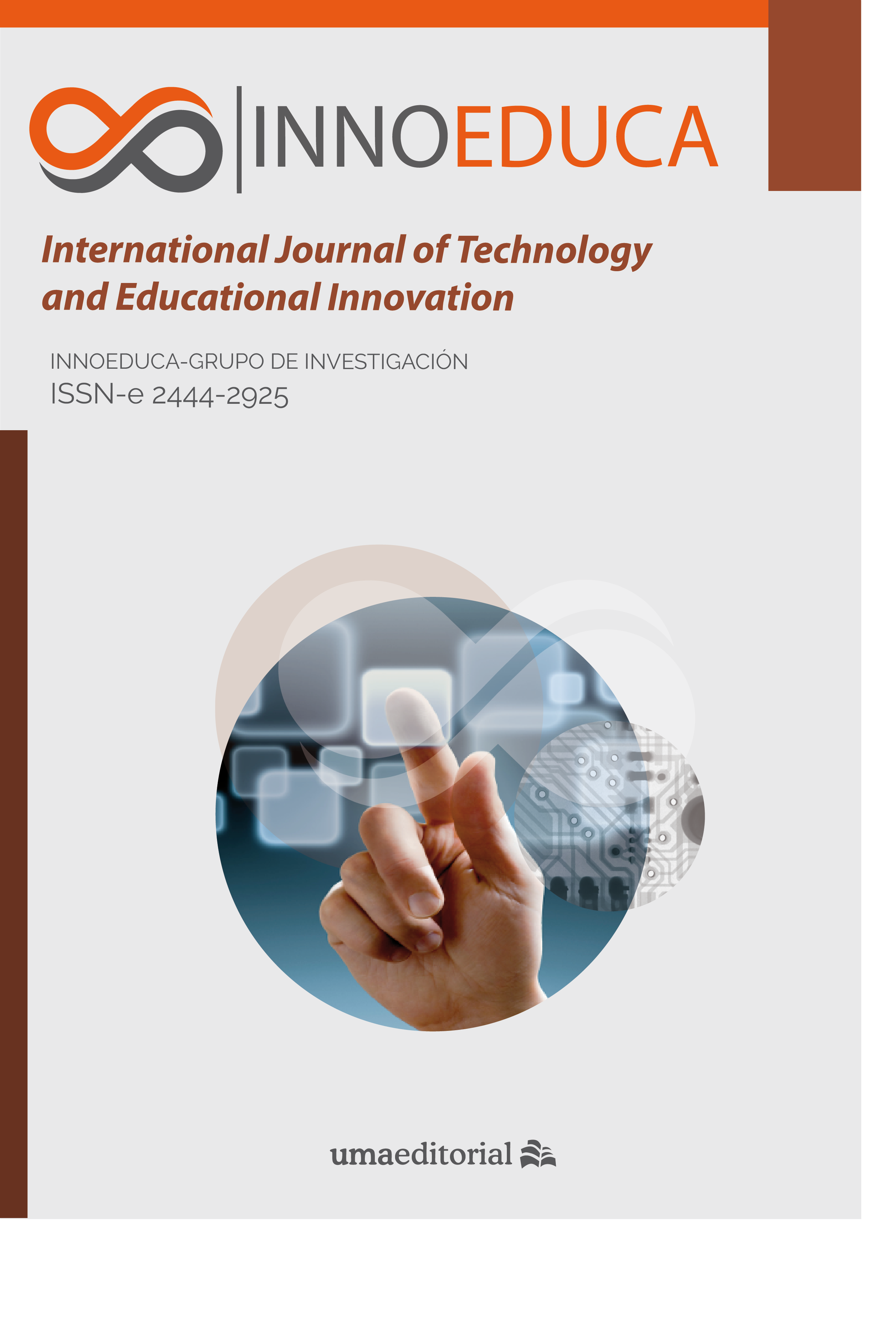Desarrollo de objetos de aprendizaje para el aprendizaje de las estructuras de datos
DOI:
https://doi.org/10.24310/innoeduca.2020.v6i1.5297Resumen
En este trabajo se describe el desarrollo y evaluación de varios objetos de aprendizaje que se usarán como componentes de un curso MOOC (Masive Open On Line Course) en el marco de trabajo de las Comunidades Digitales de Producción gestionadas por la red CODAES (Comunidades Digitales para el Aprendizaje en Educación Superior) en México. Los materiales surgen ante la necesidad de proveer a los alumnos de nivel superior de profesiones afines a la computación diferentes medios de aprendizaje sobre temas complejos y necesarios en su formación. Los índices de reprobación actuales muestran que las técnicas de enseñanza tradicionales no han resultado efectivas para lograr el aprendizaje de algunos tópicos como la programación; los datos confirman que esta competencia es difícil de adquirir para los estudiantes por lo que es necesario buscar alternativas para el aprendizaje de los alumnos.
El equipo de investigación desarrolló como parte central de la preparación del curso MOOC de estructuras de datos varios objetos de aprendizaje que abordaron los tópicos relacionados al uso de los árboles binarios. La evaluación de los alumnos que los usaron fue favorable en los aspectos de: percepción de utilidad de los materiales, la pertinencia de las actividades, la facilidad de las tareas encomendadas y sobre la claridad de indicaciones y cuestionamientos. Los resultados de esta evaluación permiten considerar que los objetos de aprendizaje desarrollados en esta fase de trabajo serán bien recibidos en el curso MOOC del cual serán parte.
Descargas
Métricas
Publicación Facts
Perfil de revisores N/D
Información adicional autores
Indexado: {$indexList}
-
Indexado en
- Sociedad Académica/Grupo
- N/D
- Editora:
- Universidad de Málaga
Citas
Arias Guerra, Y., & Arias Guerra, Y. (2011). Desarrollo de una biblioteca de estructura de datos avanzadas. Revista Cubana de Ciencias Informaticas, 5, 8. Obtenido de http://www.redalyc.org/articulo.oa?id=378343674003
Astete, M. G. (2014). Videojuegos para apoyar el desarrollo de competencias TIC en. Revista de Educación a Distancia.
Avalos , I., Ramírez, L., Enciso, R., & Flores , M. (2014). Evaluación de la adquisición de competencias: Caso estudiantes del Área de Ciencias Básicas e Ingenierías de la Universidad Autónoma de Nayarit (Vol. vol 12). Revista EducateconCiencia . Recuperado el mayo de 2018, de http://www.tecnocientifica.com.mx/educateconciencia/index.php/revistaeducate/article/view/218/216
García-Mundo L , Vargas-Enríquez J. Genero M. y Piattini M (2014) ¿Contribuye el Uso de Juegos Serios a Mejorar el Aprendizaje en el Área de la Informática?, Actas de las XX JENUI. Oviedo, 9-11 de julio 2014, pp 303-310, Universidad de Castilla-La Mancha Ciudad Real, España disponible en: https://upcommons.upc.edu/bitstream/handle/2099/15478/P303ga_cont.pdf
González F, Moroni N. y Señas P (2004) Visualización de Algoritmos y Programas para el Aprendizaje de Estructuras Arbóreas, VI Workshop de Investigadores en Ciencias de la Computación, disponible en: http://sedici.unlp.edu.ar/handle/10915/21277
Guzmán Valdivia, C. (2013). REPROBATION AND LACK OF INTEREST IN MECHATRONICS ENGINEERING STUDENTS. Venezuela: Revista Orbis. Recuperado el mayo de 2018, de http://www.redalyc.org/html/709/70928419003/
Jiménez Cruz, J. (2017). Integración de un curso MOOC y de un PLN-PLE en un curso presencial sobre fundamentos de la programación. Revista de Educación a Distancia, 53.
López-Escribano, C. (2012). Scratch y Necesidades Educativas Especiales. RED. Revista de Educación a Distancia., 34.
OCDE. (2017). México – Nota país – Panorama de la educación 2017: Indicadores OCDE. Recuperado el mayo de 2018, de http://www.oecd.org/education/skills-beyond-school/EAG2017CN-Mexico-Spanish.pdf
Olabe, X. B. (2015). Pensamiento Computacional a través de la Programación . Revista de Educación a Distancia, 45.
Red CODAES. (2014). Documento Base 13 y 14 de octubre del 2014. Colima, Colima. Recuperado el octubre de 2017, de http://www.codaes.mx/content/micrositios/2/file/Documento_Base_CODAES.pdf
Red CODAES. (2015). Objeto de Aprendizaje. Colima , Colima. Recuperado el noviembre de 2017, de http://www.codaes.mx/content/micrositios/2/file/GuiaOA-CODAES.pdf
Urbina Nájera, A. (2019). Estrategia tecnológica para mejorar el rendimiento académico universitario. Píxel-Bit. Revista de Medios y Educación, 0(56), 71-93. doi:http://dx.doi.org/10.12795/pixelbit.2019.i56.04
World Economic Forum. (2016). The Global Information Technology Report 2016. (S. Baller , S. Dutta, & B. Lanvin, Edits.) Cologny, Geneva, Switzerland: Cornell University. Recuperado el enero de 2018, de http://www3.weforum.org/docs/GITR2016/WEF_GITR_Full_Report.pdf
Publicado
Cómo citar
Número
Sección
Licencia
Todos los contenidos publicados por Innoeduca. International Journal of Technology and Educational Innovation están sujetos a la licencia de Creative Commons Reconocimiento-No comercial- SinObraDerivada 4.0 Internacional, cuyo texto completo se puede consultar en https://creativecommons.org/licenses/by-nc-nd/4.0/legalcode. Por lo tanto, la copia, distribución, comunicación pública, obras derivadas y el uso comercial de los contenidos están permitidas siempre que la fuente y el autor del texto se citen.
Es responsabilidad de los autores obtener los permisos necesarios de las imágenes que están sujetas a derechos de autor.

Este obra está bajo una licencia de Creative Commons Reconocimiento-NoComercial-SinObraDerivada 4.0 Internacional.













241.png)







